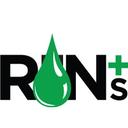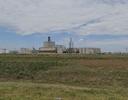Mapping The Buildout
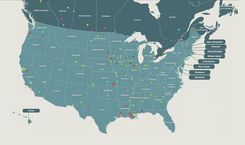

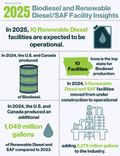
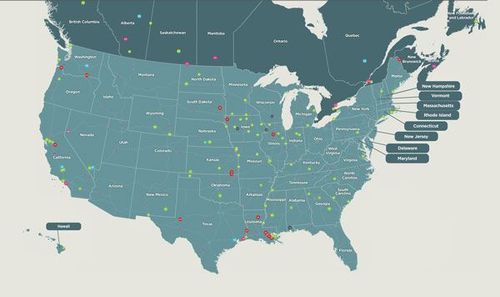
2025 Winter Biodiesel Map
December 19, 2024
BY Anna Simet
As of October 27, there were 65 biodiesel plants in the United States and Canada, six of which are currently idle/not producing biodiesel. This includes Hero BX-Clinton in Clinton, Iowa (10 MMgy); REG Ralston in Ralston, Iowa (48 MMgy); REG Marison in DeForest, Wisconsin (28 MMgy), and Delek Renewables’ three plants in Cleburne, Texas; Crossett, Arkansas; and New Albany, Mississippi, which collectively remove another 40 MMgy from U.S. production capacity (at least temporarily).
As of early October, operating biodiesel capacity in the U.S. and Canada totaled approximately 2.23 MMgy.
As for renewable diesel and SAF facilities, Biodiesel Magazine’s data shows 56 projects in various stages of development (operational, under active construction/expansion and under development/proposed), with 22 operational facilities. Of those operational facilities, 16 are producing renewable diesel only (but may be producing coproducts such as naphtha, hydrogen, etc.), four are producing both renewable diesel and SAF, and four are producing SAF only. Total U.S./Canada renewable diesel and SAF operational capacity topped 5 billion gallons going into 2025.
Of the six facilities under construction, three report initial plans to produce renewable diesel only (558 MMgy of total under construction capacity). Two report plans for SAF only—World Energy’s Houston plant conversion, which is expected to be complete in 2027 and produce 250 MMgy, and Twelve’s Moses Lake, Washington, facility, which recent reports indicate has a target of 50,000 gallons of CO2-based SAF per year. One facility under construction will produce both SAF and RD—Edgewood Renewables’ 120 MMgy plant in Las Vegas, Nevada, which is expected to come online in 2025). Three facilities are currently under expansion.
For proposed projects, 21 facilities are included on this year’s map, totaling 5.1 billion gallons of capacity (facilities not yet sharing a project location are not included).
The following includes updates on projects in various stages of development, as reported by Biodiesel Magazine online news editor Erin Voegele, and BBI International Map and Data Coordinator Chloe Piekkola.
Under Construction/Expansion
Imperial Oil & ExxonMobile-Strathcona Refinery
In November, Imperial Oil confirmed that its renewable diesel project under construction at the company’s Strathcona refinery near Edmonton, Alberta, continues to progress on schedule with startup expected during the first half of 2025. During a third quarter earnings call, Imperial Oil President and CEO Brad Corson said he is pleased with the construction progress on the renewable diesel unit at Strathcona. Corson noted that the company added feedstock coprocessing capabilities during the third quarter. He also expressed confidence regarding the underlying economics of the Strathcona renewable diesel project, noting that development of production capacity at an existing refinery allows Imperial to lower capital costs by leveraging existing utilities, rail infrastructure, staff and other elements. The facility will leverage locally produced feedstock oils, reducing feedstock transportation costs, and utilize technology provided by ExxonMobile that will allow it to produce a drop-in diesel product that is effective over a range of temperature conditions. Regulatory considerations are also much different in the U.S. than in Canada, he added, which provides additional economic support to the project.
Montana Renewables
On November 8, Calumet released third quarter financial results and outlined plans for the development of Montana Renewables’ MaxSAF initiative, which will be supported by a U.S. Department of Energy loan guarantee. The DOE has issued Montana Renewables a conditional commitment for a loan guarantee of up to $1.44 billion to fund the expansion of its biorefinery located in Great Falls, Montana.
Advertisement
Advertisement
According to Calumet, the expansion project would position Montana Renewables as one of the largest SAF producers in the world, with production capacity of approximately 300 MMgy of SAF and 330 MMgy of combined SAF and renewable diesel.
Todd Borgmann, CEO of Calumet, explained that the MaxSAF project is designed to be modular—a set of discrete projects developed in a series. The initial expansion project is expected to take approximately two years and will boost the facility’s SAF capacity to 150 MMgy. That capacity is currently expected to be operational by 2026. Further expansions will take longer to engineer and install, Borgmann added, noting they will include an expansion of renewable hydrogen production, expanded feedstock pretreatment capacity, a new wastewater system, renewable electricity and steam via cogeneration, enhanced SAF truck loading capabilities and other efficiency improvements.
Newly Operational/Ramping Up
Martinez Renewable Fuels
Marathon Petroleum Corp. confirmed in November that the Martinez Renewable Fuels biorefinery in California remains on track to be operating at full nameplate capacity by the end of the year. At full capacity, the facility can produce 730 MMgy.
Marathon officials briefly discussed operations at the Martinez biorefinery during the company’s third quarter earnings call. The facility, previously a Marathon oil refinery, was converted to a renewable diesel biorefinery via a 50/50 joint venture between Marathon and Neste Corp.
The Martinez Renewables facility began production in early 2023, but operations at the facility have been impacted by a fire that occurred late that year. During the earnings call, Marathon CEO Maryann Mannen said the company believes the Martinez biorefinery will be profitable once it is operating at capacity. John Quaid, chief financial officer at Marathon, discussed the upcoming expiration of the biobased diesel tax credit, noting the industry was still awaiting guidance on the 45Z clean fuels production credit, which is scheduled to take effect in 2025. Quaid said the company is preparing for all scenarios and believes that the market will balance out in the longer term.
Marathon also operates a 180 MMgy renewable diesel facility in Dickinson, North Dakota.
Rodeo Renewable Energy Complex
In October, Phillips 66 reported that its renewable fuels segment was impacted by lower margins during the third quarter of this year, but company officials expect margins to improve moving forward. The company also reported that it began producing SAF in September.
The company’s Rodeo Renewable Energy Complex has been under development since mid-2022 and reached full processing rates during the second quarter of 2024. Kevin Mitchell, chief financial officer at Phillips 66, reported that the Rodeo facility produced 44,000 barrels per day of renewable fuels during the third quarter. The biorefinery has a nameplate capacity of approximately 50,000 barrels per day (800 MMgy).
Brian Mandell, executive vice president of marketing and commercial, noted that the company is still in startup mode in terms of its renewable segment. He said the Rodeo facility is currently utilizing some higher-carbon-intensity feedstocks during the fourth quarter as the plant prepares for implementation of the 45Z clean fuels production credit net year.
Advertisement
Advertisement
Moving into the fourth quarter and beyond, Mandell said Phillips 66 expects to see margin improvements for renewables. He explained that feedstock prices remain depressed, and a number of renewable diesel plants are struggling. He also noted that some current renewable diesel capacity is going to be converted to SAF and cited lower imports, a tighter West Coast car diesel market, the tightening of credit markets and the disincentivizing of biodiesel production as factors that the company expects to drive stronger renewable diesel margins.
Mandell also cautioned that the Rodeo facility is not likely to produce SAF during the fourth quarter of 2024, but said the biorefinery is expected to be in steady-state operations by the first quarter of next year. SAF production should be underway at that time, he indicated.
CVR Energy Wynnewood
In late October, CVR Energy Inc. reported that the renewable diesel unit at its Wynnewood refinery in Oklahoma processed 19.6 million gallons of vegetable oil feedstock during the third quarter, down from 23.8 million gallons during the same period of 2023. The company said it ran the unit at lower utilization rates in an effort to optimize catalyst life.
David Lamp, CEO of CVR Energy, said the HOBO (heating oil to bean oil) spread for the third quarter was slightly weaker than the preceding three months due to lower diesel prices. He noted the decrease was offset by higher prices for D4 RINs and Low Carbon Fuel Standard credits, which helped drive a positive result for the quarter.
According to Lamp, the third quarter was the first full quarter of operations for the feedstock pretreatment unit. He said the company is pleased with the performance of the renewable diesel unit and pretreater for the three-month period. Lamp also provided an update on possible plans to produce SAF. He said CVR Energy’s discussions with counterparties related to the potential conversion of the Wynnewood renewable diesel unit to 100% SAF are ongoing. He stressed that that potential conversion won’t move forward without an offtake structure for SAF that would provide the company with downside protection and minimize its reliance on government credits.
Valero/Diamond Green Diesel
In October, Valero Energy Corp. reported increased production for both its ethanol and renewable diesel segments, and that its SAF project is expected to be fully operational before the end of 2024. Valero’s renewable diesel segment, which consists of the Diamond Green Diesel joint venture, reported $35 million of operating income for the quarter, down from $123 million during the same period of 2023. Sales volumes averaged 3.5 million gallons per day, up 552,000 per day when compared to the third quarter of 2023. According to Homer Bhullar, vice president of investor relations and finance at Valero, the company expects renewable diesel sales volumes for the full year 2024 to be approximately 1.2 billion gallons.
Lane Riggs, president and CEO of Valero, reported that the SAF product under development at the DGD Port Arthur plant in Texas reached mechanical completion in October and is now in the process of starting up. At press time, the project was expected to be fully operational by year-end, providing the plant with the option to upgrade approximately 50% of the facility’s current 470 MMgy production capacity to SAF.
Additional Updates
Other updates acquired by Biodiesel Magazine include Vertex Energy’s decision to idle its 200 MMgy renewable diesel plant in Mobile, Alabama, due to a lack of margin, and the closure of New Leaf Biofuel in December 2023. The company told Biodiesel Magazine that although it no longer produces biodiesel, the company has a renewables terminal in Fontana, California, that distributes biodiesel, and that the company still collects and sells feedstock.
Author: Anna Simet
Editor, Biodiesel Magazine
asimet@bbiinternational.com
Related Stories
The IEA’s Task 39 group has new research regarding the development and status of the sustainable aviation fuel industry.
The U.S. EPA on Nov. 16 released updated RIN data, reporting that nearly 2.11 billion RINs were generated under the RFS in October, up from 1.81 billion generated during the same month of last year.
Conestoga to host SAFFiRE cellulosic ethanol pilot plant
Conestoga Energy and SAFFiRE Renewables LLC announced on Nov. 16 their agreement for Conestoga to host SAFFiRE’s cellulosic ethanol pilot plant at Conestoga’s Arkalon Energy ethanol facility in Liberal, Kansas.
Officials at Calumet Specialty Products Partners L.P. discussed the company’s proposed plans to boost sustainable aviation fuel (SAF) production at its Montana Renewables biorefinery during third quarter earnings call, held Nov. 9.
SATORP, platform jointly owned by Aramco (62.5 percent) and TotalEnergies (37.5 percent), has for the first time in the MENA region successfully converted used cooking oil through coprocessing into ISCC+ certified SAF.
Upcoming Events


